
"Sierra," the locals say, shaking their heads and looking down, "sad, sad. But this city -- safe."
"Sierra," they say, "she came alone? No husband? Why did she come?"
"Sierra," another told me, "that's where her body was found."
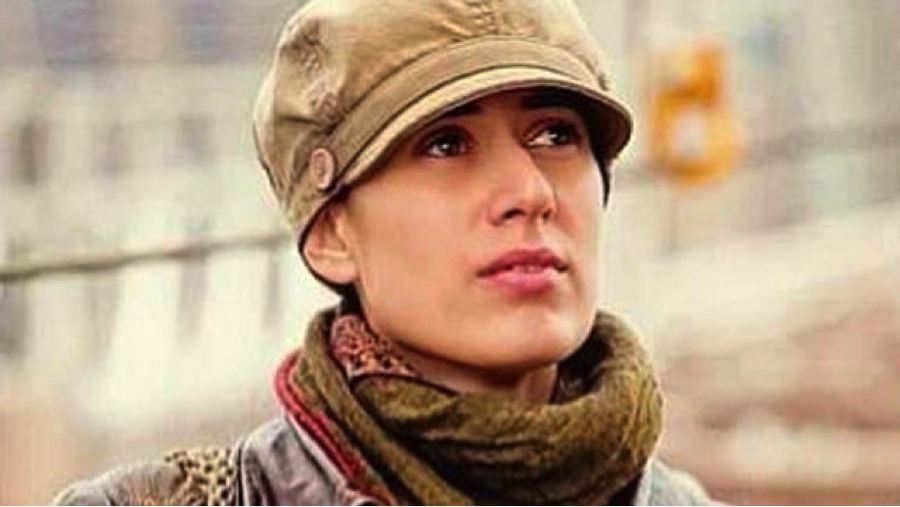
Sarai Sierra, the New York woman traveling solo who disappeared in Istanbul on Jan. 21, 2013, seems to be known by simply her last name here in Turkey, affectionately, poignantly, as though she is a communal daughter.
The missing person story dominated the headlines in New York, and blanketed the news in Istanbul. This is the Facebook picture all the news sites ran when she went missing. Sierra looked very much the focused, hopeful traveler, perhaps gazing upon one of Istanbul's stunning historical sites, hair covered like a proper Turkish woman, though with a Western cap.
Day by day, speculation and theories mounted in the American and Turkish media. U.S. tabloid media seized upon her connection to a Turkish man with whom she may have had a romantic liaison, and police questioned him. (He has since been exonerated.) Finally, on Feb. 2, her body was found near a busy, touristy part of Istanbul.
Ziya Tasali, a Turkish man -- a stranger to Sierra -- has now confessed to the killing. Tasali admits to being high on paint thinners, and says he encountered Sierra near the railroad tracks that she was interested in photographing. He attempted to kiss Sierra and she fought him, he says, attempting to hit him with her cell phone. The two struggled for thirty minutes, Tasali claims, and he beat her with a rock or stick until her body went limp, then fled the scene. A few days later, he claims, he returned to the scene, covered her deceased body, and threw her phone and iPod in the river. He then fled to Syria -- a thousand miles away -- and was later captured near the Syria-Turkey border by Turkish authorities. Tasali has been officially charged with Sierra's murder.
Preliminary results from DNA samples link Tasali to Sierra. Sierra's body was found with trauma to the head, stab wounds to her abdomen (which do not match his story) and extensive trauma to her legs. She was found in her underwear, though with no signs of sexual assault. The fatal injury to her was a blow to her head. Investigators have confirmed that the instrument of attack was a brick (another inconsistency), found with traces of Sierra's blood on it.
It's certainly a chilling story for Sierra's husband, two children, and family, and one that causes anxiety to Americans considering traveling to this Mediterranean nation. As I appeared as a legal analyst on American television to discuss it, I was asked two questions:
- Why was she not found sooner? And,
- Does this mean travel to Turkey is unsafe for Americans?
In fact, I was on my way to Istanbul just after these interviews, on a business trip. (It would be my third trip to Turkey.) So late last week, I looked for answers.
Istanbul is a huge modern city of over 12 million -- "23 million," insisted a taxi driver, dismissive of the government numbers. Spanning two continents, one can stand on a bridge over the Bosphorus River mid-city with one foot in Europe and one in Asia. It's the commercial capital of the region, with dozens of gleaming skyscrapers, yet the loud holy chant of the Islamic call to prayer reverberates like a primal moan from speakers on minarets five times daily, beginning before 5 a.m., a constant reminder of the city's spiritualism. The old and the new -- it's what attracts millions of tourists like Sierra to this simultaneously ancient and modern metropolis annually.
First, I traveled by foot, as Sierra probably did, in the most visited part of the Istanbul, the Sultanahmet neighborhood. The city's most stunning tourist attractions are all clustered here in the old city: the Blue Mosque, an enormous, majestic 400-year-old domed house of worship flanked by six towering minarets; the luminous sixth century underground Basilica Cisterns, supported by 336 ionic and Corinthian marble columns; the Hagia Sofia, a massive Byzantine 1600-year-old church-then-mosque-now-museum; and the opulent Topkapi Palace complex, the primary residence for Ottoman Empire sultans since the fifteen century, featuring artifacts, dazzling royal jewelry and furnishings, and questionable items like "the saucepan of Abraham" -- yes, the Old Testament Abraham. Law students: establish the chain of custody on that one.
Tourists throng these streets to visit these sites, stopping in the cafes for hot little curved glasses of sugary Turkish tea or tiny porcelain cups of potent, sludgy Turkish coffee. Rug dealers call out to any who glance in the general direction of their shops, and vendors hawk magnets in the shape of whirling dervishes. Even in the off-season, Europeans, Asians and Americans crowd the narrow cobblestone streets, spilling off the sidewalks to compete with honking taxis and street traffic.
In short, it's impossible to imagine a woman beaten or abducted here without dozens of people seeing her assaulted or hearing her scream. A body could not be hidden here for days or weeks.
The mystery deepened.
Then I discovered that Sierra was not found exactly here, despite some news reports. My guide drove me a few blocks away, over by the fifth-century city walls, pointing, "Sierra -- there."
"That's where her body was found?" I asked.
"Yes, under the arches. In the walls."
In the walls?
Initially built by Constantine the Great in the fifth century A.D., the ancient stone walls for centuries surrounded and protected Constantinople (as the city was then known) against attack from both sea and land. The elaborate system of double walls and tunnels saved the city, and the Byzantine Empire with it, from sieges from the Avars, Arabs, Rus', Bulgars, and others. Many portions of the ancient walls still stand, other sections crumble, and still others are under repair.
"Can you stop the car, please, so I can go look?" I asked my guide.
"No," he told me, "I'll lose my license," he said. He'd gone to university for years for that tour guide license, and his livelihood was based on it.
So I took these pictures of the wall on my own from the busy Kennedy highway -- named for our thirty-fifth American president, beloved by Turks.
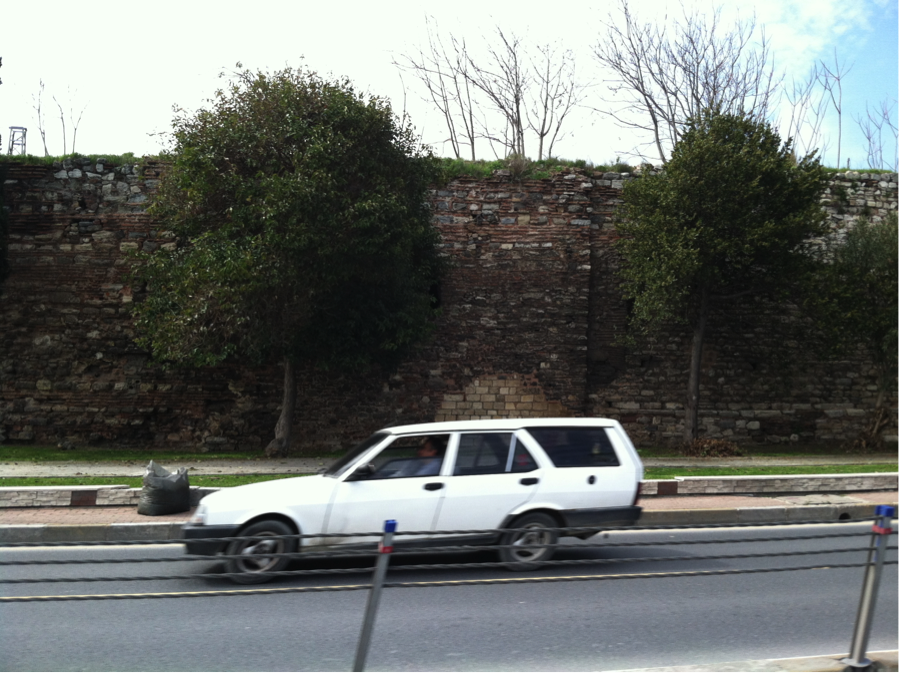
I didn't see how a body could be hidden in that wall.
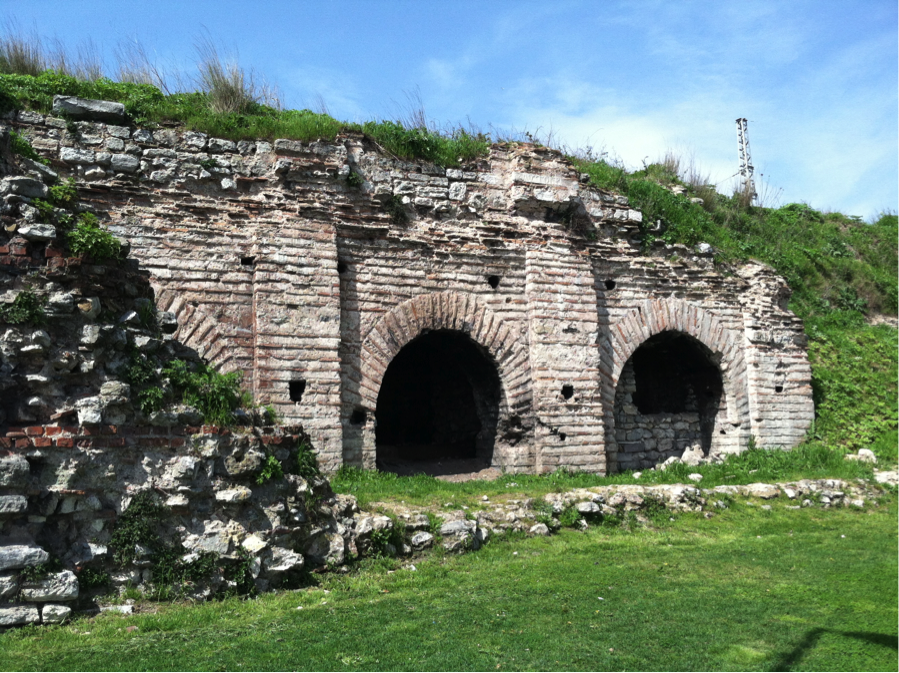
Then I saw the arches. Aha.
The following day, I returned on foot to investigate further, accompanied by some fellow Americans.
Kennedy Avenue, the outer ring of the touristy Sultanahmet neighborhood, is like New York City's FDR Drive or Los Angeles' Pacific Coast Highway: a multi-lane high-speed motorway along the water that's just this side of a freeway, unfriendly to pedestrians. A narrow, jagged footpath meets Kennedy Avenue foot travelers, and in several portions one must turn sideways and back along the wall to stay out of traffic.
When we reached the portion of the crumbling stone city walls where I'd been told Sierra's remains had been discovered, I asked a city police officer patrolling the area if this was the place. Yes, he confirmed immediately, "Sierra, there," pointing. Then he wagged his finger at me in the universal sign language for "oh no you don't" and warned me in English, "forbidden."
"Yes," I smiled in agreement, and went around the corner and proceeded to the forbidden place.
Now I understood how her body could be hidden inside a wall, because the outer wall opened into a cavernous, high ceilinged stone tunnel, and one open-aired room after another.
Heartbreakingly, it was the perfect place to hide a body: close to a well-traveled area, just off a major highway (ideal for a quick getaway), in a foul-smelling, tourist-repellent area where few ventured on foot, despite its historical significance.
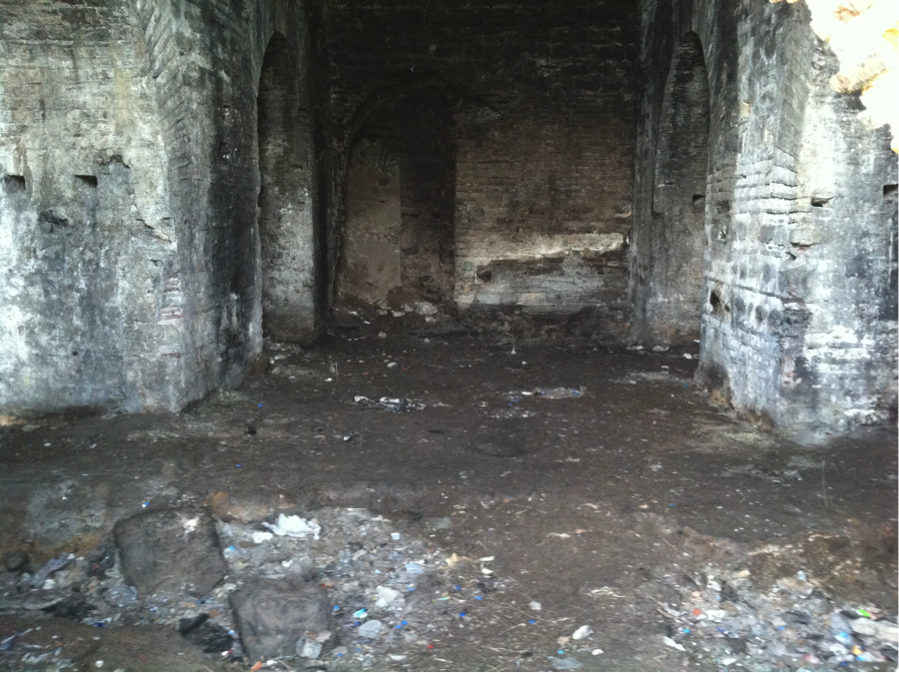
Within these walls is a series of tunnels, inside which arches open to hidden, dark alcoves.
Istanbul's ancient city walls have surely been crime scenes for every type of illegal activity imaginable over the centuries. They'd be ideal for drug deals, fencing stolen property, sexual assaults, or disposing of human remains.
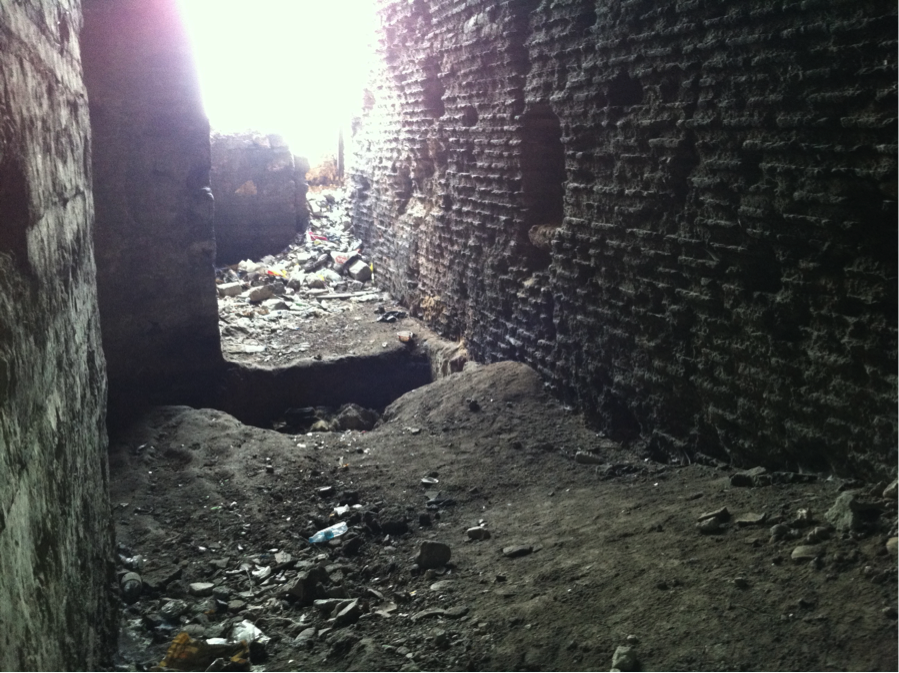
Garbage was strewn about, and a strong urine smell permeated. Like Sierra, I enjoy traveling independently, and going off the beaten track, but I was glad my friends were with me when I explored this creepy, dank place.
Why was Sierra's body not found sooner? Because her killer had found a convenient, difficult-to-detect place to hide her remains. Even the odor of decomposition would not have alerted the rare passerby, given the already rotten smell coming from within, and which surely already deters even adventurous tourists from entering the walls from Kennedy Avenue.
As to the second question about traveling in Turkey, one murder -- even one as sad and brutal as this one -- cannot be extrapolated to a generalization about an entire city or country. The fact is that Istanbul in general is a safe place to visit. According to the United States State Department Bureau of Security, Istanbul's overall crime rate remains lower than that of other cities of comparable size.
Indeed, the metropolis has special tourist police, concentrated heavily in the Sultanahmet neighborhood, there to protect foreigners from the usual pickpocketing or cons found in any major city in the world (or more serious crimes, in the rare instances in which they arise). One of this city's favorite scams, according to the State Department, features young locals waiting outside hotels to "help" arriving guests take bags in from the cabs -- and then absconding with their loot.
When Sierra went missing, the local "polis" acted decisively by forming a special investigation unit whose sole focus was to find her and her abductor. They went to the media to get her picture out everywhere, asking the public's help, quickly and appropriately. And within weeks find her they did, albeit, tragically, too late. The suspect is in custody, and the police have his confession and physical evidence to back it up. In short, law enforcement did its job, and no one has claimed otherwise.
Locals all told me emphatically that no one blames Sierra for her victimization: that a woman should be able to walk alone wherever she likes, whenever she likes. After a few minutes repeating this point, they then went on to say that the chances of becoming a crime victim rise when a woman walks alone, at night, in less populated areas. And that is true just about everywhere on the planet.
Who can deny that?
Alas, the type of creep who killed Sierra exists all the world over -- a drugged-out man who responded to a woman's rebuff with violence. U.S. news is filled with missing women, rapes and other violent crimes. Are we afraid to travel in our own country? Rarely.
One incident, of course, ought not to tar an entire country as dangerous. A generation ago the Oscar-winning film Midnight Express was presented as a harrowing "true" story of an American convicted of drug smuggling in Istanbul, who endured beatings and horrors in a Turkish prison. Though the movie took substantial liberties with the truth -- an attempted rape scene in the film, for example, never happened at all, and virtually every Turkish character is the film is caricatured as a monster -- when I traveled the country in 1999 nearly every American I knew warned me that Turkey was dangerous, citing Midnight Express as their proof. At the time, many Turks told me that Midnight Express had singlehandedly destroyed the American tourism market in Turkey. They also claimed that Turkey had a superior human rights record to the U.S.
The filmmakers ultimately apologized for their unfair treatment of Turks, but not before a generation of Americans was scared out of visiting this vast, diverse country. And what a shame, because the Turkish towns Istanbul, Cappadocia and Pamukkale are among my global favorites, out of over 55 countries I've visited in my life so far. And I'd rate Turkey No. 1 in the world I've seen in hospitality, with its over-the-top friendliness in extending itself to visitors. In one case, when my bus did not arrive, a kind stranger insisted on driving me an hour and a half away to my hotel, and refused and payment for the favor. He apologized repeatedly to me that I had missed my bus. And don't even think about entering a shop or home and turning down their offer of tea.
I've spent many years covering crime stories on American television. Violent crimes are wrenching for the families, and we all mourn the loss of one of our citizens abroad, especially in shocking circumstances like these. But sometimes our media coverage needlessly fans the flames of our fears, because "fear drives ratings," as one network exec told me. Let's not fall for it, nor should we leap to unfair conclusions about other countries without carefully examining the facts on the ground. I've been mugged twice in my life, in New York and San Francisco, but never in a foreign country, for example.
We dishonor intrepid travelers like Sarai Sierra if we cower at home. We lose an appreciation of other cultures, even those of our friends (Turkey has been a key American ally in the region for many years). Take reasonable precautions, stick together in pairs or groups, be wary and alert in dark, empty areas in any city, and otherwise, take lots of pictures and bring home lifelong memories.
Turn off the scary crime stories now and then. They frighten even me occasionally, but remember, they are newsworthy precisely because they are bizarre, outlier stories. "Millions of tourists have a great time in the Near East this year and every year" does not generate ratings. Take a deep breath, and go, America -- to Turkey, and beyond.
